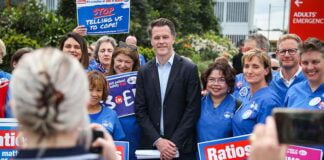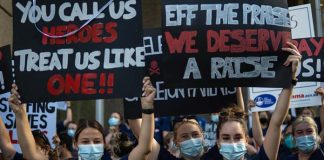Up to 200 psychiatrists in NSW have begun a mass exodus from the public mental health system in response to stalled union negotiations and government inaction.
Understaffing is a serious problem. Currently of a total of 540 possible psychiatric positions more than 200 remain unfilled.
According to a statement by the Royal Australian and New Zealand College of Psychiatrists, “The loss of over 200 senior psychiatrists from within the health system will significantly impact people with acute and critical mental health care needs.
“These are some of the most vulnerable people in our community and disruption to their care will have wide ranging impacts for them, their families and carers.”
The threat of mass resignations follows the high-profile resignation of Mental Health Australia chair Matt Berriman in April, in response to perceived government inaction on mental health.
Announcing his resignation, Berriman pointed to the disparity in the amount of money government was spending on the military and the NDIS versus money going towards mental health.
The Australian Medical Association has also lambasted the state of Australia’s mental healthcare system, declaring that it is “underfunded, fragmented and a nightmare to navigate for those who need it most”.
Base pay
The psychiatrists’ threat of mass resignations also comes as months of bargaining between the Australian Salaried Medical Officers Federation (ASMOF), the union representing salaried doctors, and the NSW State Government over a new enterprise agreement has stalled.
The union has been pushing for a one-year base pay increase of 25 per cent. The state government has offered a mere 10.5 per cent over three years—a pay offer below inflation and, more significantly, below the ABS’s cost of living index.
The ABS has estimated that a full-time worker on an average salary was almost $8000 worse off this year than the same time last year, the sharpest annual drop in living standards since the Great Depression.
While the Minister for Mental Health, Rose Jackson may describe her government’s offer to psychiatrists as “the largest pay increase to psychiatry staff specialists in more than a decade”, psychiatrists employed in the NSW public health system get 30 per cent less pay than colleagues interstate.
The issues in the public system go well beyond pay. Professor Ian Hickie, Director of the Brain and Mind Centre at the University of Sydney, was quoted in the Guardian as saying, “The way the system is currently structured has great trouble functioning—we’re having a major crisis in public mental health care.”
Australia’s public mental health system is structured so that senior psychiatrists not only provide direct support to people but also supervise staff in training positions, increasing the pressure on them.
The breaking point for many psychiatrists seems to be the government’s pilot for a “productivity trial”, which is slated to run from 1 January to 30 June.
The pilot contains three initiatives which the government says will “increase productivity and efficiencies to assist staff specialist psychiatrists in managing increasing demands in a period of national workforce shortage”, an insult to the overworked understaffed workers currently in the system.
“The proposed pilot will be the final straw for psychiatrists,” ASMOF NSW President Dr Nicholas Spooner told media.
“Patients are the ones paying the price for this government’s failure to act. A productivity pilot won’t fix the massive unfilled psychiatry positions or reduce wait times for people in crisis,” he added.
Mental distress
The exodus comes as mental distress is rife
According to data published in 2022 by the Australian Institute of Health & Welfare, 44 per cent of Australians aged 16-85 have experienced a “mental disorder” during their life.
Some 21 per cent have experienced a “mental disorder” in the past 12 months and 5 per cent (or 800,000 people) are said to experience severe mental distress.
Mental health challenges are more prevalent among marginalised and oppressed communities including people living in rural and remote areas, women, queer folk, Aboriginal and Torres Strait Islander people, disabled people and refugees and asylum-seekers.
Neoliberal cuts and productivity-enhancing measures only deepen the crisis and despair and need to be fought.
Only united action by mental health services users, workers and unions can win the changes and reforms necessary for the humane, well funded support for people experiencing mental health challenges.
By Tom Fiebig






